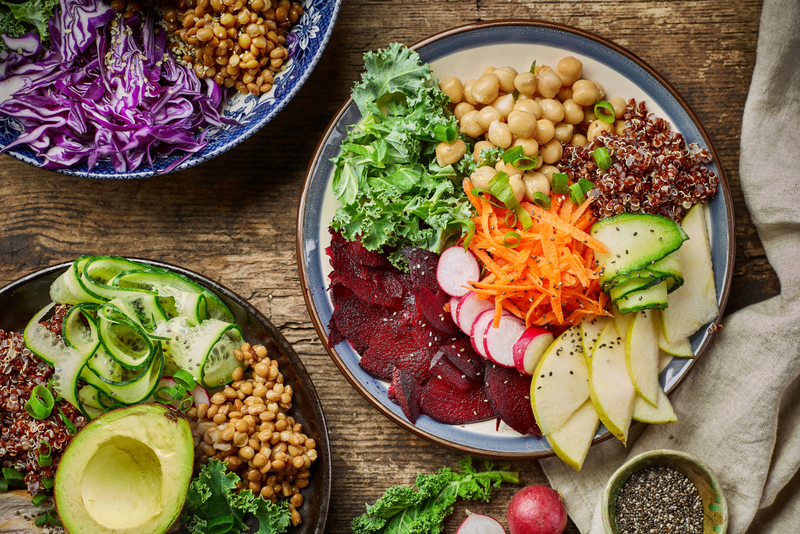News
Food as Medicine with Lilia Brown

Lilia Brown, FNP is a functional medicine nurse practitioner at Vail Health with a specialty in healthspan. What is healthspan, you ask? While many people focus on lifespan—how long you can live—what really matters is healthspan, or how many years you can live in good health. On April 3, Lilia discussed how inflammation plays a key role in aging, weight gain, fatigue, brain fog, and joint pain. She also shared how certain anti-inflammatory foods and key supplements can help you feel more vibrant, energized, and resilient.
As a Nurse Practitioner practicing in Functional Medicine, I like to think of food as medicine. Inflammation isn’t always bad. It’s your body’s natural defense system to heal wounds and fight infections. Many common symptoms—like fatigue and weight gain—are actually signs of chronic inflammation which can lead to heart disease, diabetes, autoimmune disorders, and even dementia.
What we eat every day can either fuel inflammation or fight it.
Lets start with everyone’s favorite: Fats
First off, fats do not make you fat—they play an essential role in regulating hormones, brain function, and inflammation, so it is important that you make sure you have quality fats in your diet. However, The Standard American Diet has a dangerously high ratio of bad fats to good fats. This imbalance leads to chronic inflammation, heart disease, and metabolic issues. There are three types of fats that I want to talk about: unsaturated fats, saturated fats, and trans fats.The best type of fat you want to include in your diet are the unsaturated fats:
- Monounsaturated Fats – Olive oil, avocados, and nuts (such as almonds, pecans, and pumpkin seeds) can improve your blood cholesterol levels.
- Omega-3 Fatty Acids are a type of polyunsaturated fat that is really important because they are essential fatty acids: meaning they can’t be made by the body so we must get them from food. Wild-caught salmon, sardines, flaxseeds, chia seeds, walnuts.
- Saturated Fats (should be limited) – include dairy and meat sources. Coconut oil is a plant source of saturated fat that is ok to eat in moderation and good for the brain.
Now let’s talk a little about Carbs
Carbohydrates or carbs aren’t the enemy—but the type of carb also matters! Carbs are our body’s main source of energy, but if your body doesn’t need energy, carbs will be converted into triglycerides and stored in the liver, muscles, and fat cells. We want to AVOID overeating carbohydrates, especially "simple carbs" or sugar, as they will spike your blood sugar, cause insulin resistance, and drive inflammation- these are often found in the ultra processed foods. Instead, when we think about carbs, we want to fill our plates with colorful vegetables and fruits full of fiber and nutrients. Two important nutrients in our carbohydrates are phytonutrients and fiber.Why does fiber matter?
- Essential for gut health as it feeds good gut bacteria (improving digestion & our immune system).
- Reduces inflammation by supporting a healthy gut lining.
- Soluble fiber contributes to feeling full and decreases absorption of dietary sugar and will improve your lab levels of blood fat and blood sugar.
- Insoluble fiber provides bulk to prevent constipation.
The majority of your carbohydrates should be vegetables that offer fiber and phytonutrients to fight inflammation. Fruits in moderation are important sources of vitamins, minerals, and antioxidants but can also have high amounts of sugar so should be limited.
A healthy meal with carbs should include:
- Colorful Vegetables & Fruits – berries, leafy greens, cruciferous veggies (broccoli, cauliflower, kale).
- Whole Grains & Legumes – are considered carbs but can have some protein as well as fiber and vitamins and minerals: quinoa, wild rice, and oats, and beans
- Other Fiber-Rich Foods – flaxseeds, chia seeds, legumes, avocado, and sweet potato.
Finally, let’s talk about Protein
Protein is more than just muscle—it helps balance blood sugar, reduce cravings, support immune function, and keep bones strong as we age. You can get your proteins either from animals or plants or both. Plant proteins alone, however, are considered incomplete because they have low levels of essential amino acids (amino acids that our body doesn’t make). As a vegetarian it is important to eat a variety of high protein foods to ensure you are getting complete proteins.Best Sources:
- Animal-based: Lean meats such as poultry, eggs, and wild-caught fish. Grass fed beef and dairy proteins should be limited.
- Plant-based: Lentils and legumes, quinoa, hemp seeds, and soy proteins such as tofu or tempeh.
- High protein vegetables include dark leafy greens, asparagus, bok choy, and broccoli.
- Vegetarian protein powders such as pea protein powders are important if you need to supplement to boost your daily intake.
How much protein do we need? As Dr. Vickerman explained, as we get older we have to combat the loss of muscle mass. This is called sarcopenia.
- We want to aim for 1g per kilogram of body weight—that’s about 20-30g per meal to maintain muscle. But we don’t want this to be all from animal proteins, you need to get some of this protein from plants too.
- View our handout with serving examples of 20-30g of meat or plant proteins.
And an added bonus of Supplements
Even with a perfect diet, which doesn’t actually exist, modern foods often lack key nutrients. This is where targeted supplements come in. When choosing a supplement it is important to select one that meets “Current Good Manufacturing Practices” (cGMPs). cGMPs are standards implemented by the FDA and exist to meet specific quality and safety criteria. You will see this labeled on high-quality supplements.- Omega-3 Fatty Acids (Fish Oil) - AKA the Good Fat
- Omega-3 Fatty Acids supports: brain health, reduces joint pain, and lowers inflammation.
- Vitamin D3 + K2
- Vitamin D is essential for bone health, immune function, and reducing inflammation
- The body naturally produces Vitamin D when skin is exposed to sunlight, but Latitude and the season plays a major role in how much Vitamin D your body can produce from sunlight. We absorb less in Colorado, and many people are found to be deficient or low in Vit D when tested.
- Vitamin D can also be found in foods such as mushrooms, egg yolks, and fatty fish.
- Vitamin K is crucial for bone strength, blood clotting, and heart health, and works with Vitamin D to improve calcium absorption.
- Probiotics, Prebiotics
- Pro and prebiotics support gut health, reducing systemic inflammation and improving digestion. Probiotics are supplements of good gut bacteria whereas Prebiotics are types of fiber that feed and nourish probiotics.
- Synbiotics = Probiotics + Prebiotics working together to enhance gut health and boost digestion, immunity, and nutrient absorption. They ensure probiotics survive longer in the gut by giving them the right fuel to thrive.
- Some good Synbiotic Food Combinations:
- Yogurt + Berries & Flaxseeds
- Sauerkraut + Cooked & Cooled veggies
- Kefir + Bananas + oats
- Miso Soup + Garlic & Onions
- Some good Synbiotic Food Combinations:
In closing… all of this seems complicated but it doesn’t have to be that way. When choosing what to eat, try to focus on eating a variety of anti-inflammatory whole foods and they will help you feel more vibrant, energized, and resilient. I think if we follow the advice of the famous food and nutrition author, Michael Pollan, “Eat real food, not too much, and mostly plants” we will be able to succeed in providing our bodies with food that heals.
Start with one small change this week—like adding a handful of berries to your breakfast. Your body will thank you!
More News
-
New!
More

First Chair to Last Call: What Does Alcohol Really Mean For Your Health?
In nearly every Colorado ski town, some iteration of the neon sign blares its play-hard-party-harder anthem. It’s a not-so-subtle nod to mountain party culture, a lifestyle that normalizes combining sports and outdoor adventures with heavy drinking and partying. In Eagle County, après culture, high-altitude living and outdoor performance have coexisted for as long as locals have been sliding on snow. But how much is too much at altitude? And what role do social support systems play in helping residents find balance?
-
New!
More

Counting More Than Steps: How Wearables Can Help (or Hinder) Your Health
From step counts to sleep stages, heart rate variability to blood sugar spikes, wearable devices are giving us a front-row seat to what’s happening inside our bodies. Strapped to wrists, slipped onto fingers or wrapped around our biceps, wearables like the Oura Ring or Whoop strap promise insight and advice in the quest for better health.
-
More

Cass Barham and Sarah Crabtree Honored As Recipients of Vail Health Elevate Award
Cass Barham and Sarah Crabtree, both lab techs at Vail Health Hospital, have been named recipients of the Vail Health Elevate Award. Vail Health created the Elevate Award in June 2022 to give patients and their families an opportunity to nominate and thank employees who have touched their lives in some way.
